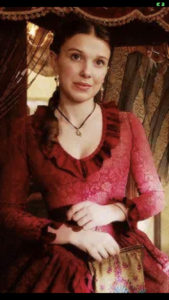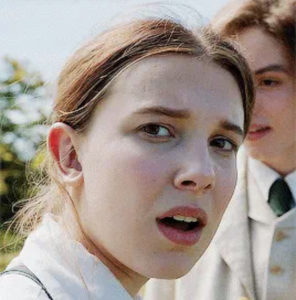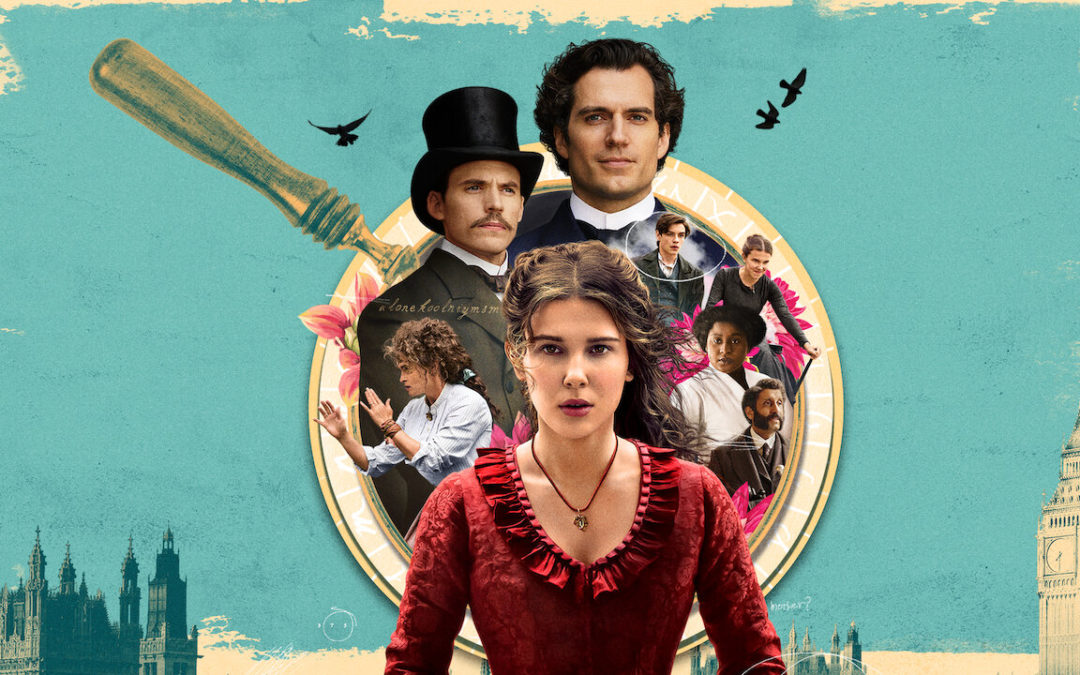Enola Holmes (2020), directed by Harry Bradbeer, is a well-produced movie with an amazing cast and delightful set and costume design, but that’s all that can be said for its praise. With many faces recognizable from other Netflix shows (Stranger Things’ Millie Bobby Brown playing Enola, The Witcher’s Henry Cavill playing Sherlock, and The Crown‘s Helena Bonham Carter playing Eudora Holmes), the star-studded cast is the main draw of this film. The story, based on the book series Enola Holmes by Nancy Springer, follows Enola, teen sister of adult Sherlock and Mycroft Holmes. She is living a charming life outside Victorian London until her mother goes missing on her sixteenth birthday, and she must find out why and where her mother is – all while dodging her brothers and a teenage runaway lord she encounters along the way. It’s a brand new take on an old set of characters, yet still manages to feel like a movie I’ve watched before.
If you liked Netflix’s Anne of Green Gables or A Series of Unfortunate Events, you will definitively enjoy Enola Holmes. This film takes the precocious, classic characters-holding-modern-views trope and moral compass of Anne Shirley-Cuthbert and blends it with the mysterious, quirky character-filled, fast-paced plot of A Series of Unfortunate Events perfectly. Holmes is humorous and often breaks the fourth wall to crack a joke or fill in some exposition, and while entertaining, may confuse the audience as to whether or not this movie wants us to take it seriously. This is only heightened by the actors’ portrayal of the characters, which is nothing less than delightful to watch. Like when Brown as Enola flips from a serious and capable woman to a teenage girl unsure how to handle her first crush, or Cavill switches from trying to catch Enola to a big brother teasing about childhood toys. This leaves the viewer unsure where the characters stand at the end of the film, but satisfied in roles well played. Unfortunately, the same cannot be said for the plot.

Enola’s first appearance as a ‘lady’.
Netflix frames Holmes as a feminist movie and tries to execute a feminist plot, but it came out weak at best and hypocritical at worst. This can be seen when Enola verbally objects to stays (a type of Victorian corset/bra) and a dress bustle, but the next day changes her mind and buys them along with a fancy dress to fit in with the London crowd. While the costume department clearly used this chance to flex their skills with some beautiful dresses, the flip-flop of personal views by Enola undermines the attempted message. Another example would be how Enola’s mother had raised her with nearly radical feminist views for the time, yet the only onscreen reaction to men saying sexist things is Enola giving a ‘can you believe this?’ look to the audience.

A fourth-wall-breaking eye-roll after a thoughtless comment.
Another example would be that while Enola is supposed to be a feminist, there are only two women that she talks to and respects, one of whom is her mother who disappears ten minutes in. It’s clear Netflix wanted points for trying – but they won’t be getting an A from me.
Overall, the movie seems to stray from its theme so much that it barely holds a consistent message. Is it a mystery? Is it a coming-of-age film? A romance? A feminist period film? All of the above apply at some point, but none remain consistent throughout the movie. In fact, the plot described in the movie summary has little to no relevance, so much so that Enola actively changes her narrated plan completely halfway through the movie.
I would call it a family movie, but there are some scenes that are grim and out of place for this film – like a graphic scene of Enola’s attempted murder by drowning and the close-up onscreen death by head trauma that earned this movie a PG-13 rating. It earns itself a 3/5 rating from me due to the expert editing, acting, set and costume, and production – but, the plot and lack of follow-through will not bode well for the sequel expected to be confirmed soon.


Recent Comments